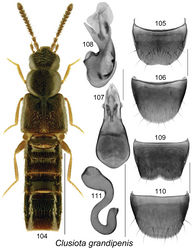Clusiota grandipenis
| Notice: | This page is derived from the original publication listed below, whose author(s) should always be credited. Further contributors may edit and improve the content of this page and, consequently, need to be credited as well (see page history). Any assessment of factual correctness requires a careful review of the original article as well as of subsequent contributions.
If you are uncertain whether your planned contribution is correct or not, we suggest that you use the associated discussion page instead of editing the page directly. This page should be cited as follows (rationale):
Citation formats to copy and paste
BibTeX: @article{Klimaszewski2015ZooKeys, RIS/ Endnote: TY - JOUR Wikipedia/ Citizendium: <ref name="Klimaszewski2015ZooKeys">{{Citation See also the citation download page at the journal. |
Ordo: Coleoptera
Familia: Staphylinidae
Genus: Clusiota
Name
Clusiota grandipenis Klimaszewski & Webster sp. n. – Wikispecies link – ZooBank link – Pensoft Profile
Holotype (male)
Canada, New Brunswick, Westmorland Co., Sackville near Ogden Mill, 45.92155°N, 64.38925°W, 12.V.2006, Scott Makepeace coll. // Black spruce forest, in nest contents of Great Horned Owl – Bubo virginensis (LFC). Paratype: Canada, New Brunswick, Northumberland Co., ca. 2.5 km W of Sevogle, 47.0876N, 65.8613W, 27.VIII.2013, old jack pine forest, in decaying gilled mushroom, R.P. Webster (RWC) 1 female.
Etymology
The specific name grandipenis, meaning large penis, refers to the large tubus of the median lobe of the aedeagus of this species.
Diagnosis
Body length 2.2 mm, subparallel, flattened, dark brown, abdomen slightly darker than remainder of the body, legs yellowish brown (Fig. 104); integument glossy, densely punctate and densely pubescent on forebody and less so on head and particularly on abdomen, microsculpture of forebody fine, meshed with hexagonal sculpticells; head about as wide as pronotum, slightly angular posteriorly, eyes large and as long as postocular area dorsally; pronotum rounded laterally and basally, transverse, narrower than elytra; elytra wider and longer than pronotum; abdomen subparallel. MALE. Tergite VIII slightly emarginate apically (Fig. 105); sternite VIII broadly rounded apically (Fig. 106); median lobe of aedeagus with broadly oval bulbus streamlined with apically narrowly triangular tubus in dorsal view (Fig. 107), in lateral view tubus strongly produced ventrally, apex narrowly triangular and slightly pointed (Fig. 108), internal sac structures pronounced (Figs 107, 108). FEMALE. Tergite VIII with shallow apical median emargination (Fig. 109); sternite VIII rounded apically (Fig. 110); spermatheca S-shaped, capsule broadly club-shaped with deep median invagination, stem sinuate with posterior loop (Fig. 111).
Natural history
One adult was found in the nest contents of a Great Horned Owl, – Bubo virginensis in a black spruce forest in May and another from a decaying gilled mushroom in a jack pine forest during August.
Distribution
Known only from NB, Canada.
Original Description
- Klimaszewski, J; Webster, R; Sikes, D; Bourdon, C; Labrecque, M; 2015: A review of Canadian and Alaskan species of the genera Clusiota Casey and Atheta Thomson, subgenus Microdota Mulsant & Rey (Coleoptera, Staphylinidae, Aleocharinae) ZooKeys, (524): 103-136. doi
Images
|
